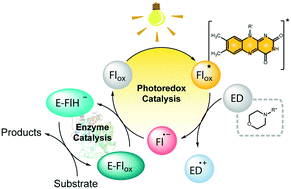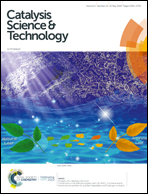Boosting photobioredox catalysis by morpholine electron donors under aerobic conditions†
Abstract
Light-driven reduction of flavins, e.g. FAD or FMN, by sacrificial electron donors emerged as a convenient method to promote biocatalytic transformations. However, flavin activation has been restricted to oxygen-free conditions to prevent enzyme deactivation caused by reactive oxygen species (ROS). Herein, we show that the photoreduction of FMN by morpholines, including 3-(N-morpholino)propanesulfonic acid (MOPS), lessens the deactivation of the enoate reductase XenB from Pseudomonas sp. during the stereoselective asymmetric enzymatic reduction of a model α,β-unsaturated diketone under aerobic conditions, leading to a 91% GC-yield and a stereoselectivity greater than 94%. The kinetic stability of the thermolabile XenB was increased by more than 20-fold in MOPS buffer compared to that in Tris-HCl buffer, and a pronounced positive effect on the transition midpoint temperature was observed. The reactive form of the FMN photocatalyst is stabilized by the formation of a 3[FMN˙−–MOPS˙+] ensemble, which reduces the formation of hydrogen peroxide and other ROS in the presence of oxygen. These results contribute to broaden the application of photobiocatalytic transformations using flavin-dependent reductases.



 Please wait while we load your content...
Please wait while we load your content...